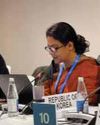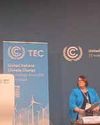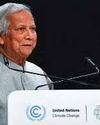
The world agreed on a long-negotiated climate deal on 24 November, but for many poorer nations — the most vulnerable to worsening climate disasters — it felt like a slap in the face. A $300 billion-a-year pledge from wealthy nations was seen as insultingly low, falling far short of what these nations say they need to address the climate crisis.
After two grueling weeks of chaotic negotiations and sleepless nights, nearly 200 countries reached an agreement in the early hours in Baku, Azerbaijan. The road to the deal was anything but smooth, with tempers flaring and walkouts threatening to derail the talks altogether.
Developing countries had rejected an earlier offer of $250 billion a year starting in 2035 as “a joke.” Following the backlash, wealthy nations, including the EU, US, and Japan, raised the figure to $300 billion. But for many, it wasn’t enough. Delegates from the Least Developed Countries (LDCs) and the Alliance of Small Island States (AOSIS) walked out, declaring the proposal unacceptable. A follow-up statement clarified they hadn’t given up entirely but were standing firm on their demands.
The G77 and China bloc — representing 134 developing countries — had called for $600 billion annually from developed nations by 2030, as part of a larger $1.3 trillion global climate finance target. However, this demand was quickly dismissed as unrealistic by wealthier countries.
US climate envoy John Podesta became the target of frustration. After a walkout by LDCs and AOSIS, he was met with chants of “shame” from climate campaigners accusing the Biden administration of failing to honor its commitments. “It’s shameful what they’re doing under Biden,” said Victor Menotti, director of the International Forum on Globalization, as Podesta exited through a side door, trailed by reporters.
この記事は Energy & Power の EP_22_12 (Energy & Power Vol 22 Issue 12 December 1, 2024) 版に掲載されています。
7 日間の Magzter GOLD 無料トライアルを開始して、何千もの厳選されたプレミアム ストーリー、9,000 以上の雑誌や新聞にアクセスしてください。
すでに購読者です ? サインイン
この記事は Energy & Power の EP_22_12 (Energy & Power Vol 22 Issue 12 December 1, 2024) 版に掲載されています。
7 日間の Magzter GOLD 無料トライアルを開始して、何千もの厳選されたプレミアム ストーリー、9,000 以上の雑誌や新聞にアクセスしてください。
すでに購読者です? サインイン

CLIMATE SUMMIT IN BAKU BRINGS LITTLE CHEER FOR BANGLADESH
Bangladesh, a delta nation of 170 million people, is vulnerable to climate change and related disasters. Frequent floods, cyclones, and occasional droughts claiming lives and livelihoods every year speak of the depth of the climate vulnerability.

The Promise To Mobilize $1.0tn More Is Vague
The major challenge for COP30 is to restore the trust between the Global North and the Global South. The trust deficit continues to widen in matters substantive to solving the issues, such as ambitious mitigation and scaling climate finance. However, I believe that COP30, under the progressive leadership of Lula De Silva of Brazil, a University Professor, can expect a better outcome.

ADB Launches Environment Action Plan 2024-2030
The Asian Development Bank (ADB) has launched its Environment Action Plan 2024–2030 presenting a road map for addressing the impacts of the triple planetary crisis of biodiversity loss, pollution, and climate change in Asia and the Pacific.

LDCs Trapped in Climate Debt Spiral
The Climate Debt Risk Index 2024 (CDRI), introduced by Change Initiative (CI), calls for a complete overhaul of the global climate finance framework.

Bangladesh Calls for Climate Justice, Ambitious Pre-2030 Targets at COP29
Syeda Rizwana Hasan, advisor to the Ministry of Environment, Forests and Climate Change and Water Resources, called for climate justice, urging the global community to uphold the principle of Common but Differentiated Responsibilities (CBDR).

Dream to Achieve Goals in Life, Prof Yunus Tells Youths at COP29
Chief Adviser Professor Muhammad Yunus recently called upon the youths to dream to achieve their goals in life as the dream is a power.

Fossil Fuel Emissions to Hit New Record in 2024
Planet-warming carbon dioxide emissions from oil, gas and coal rose to a new record high this year, according to preliminary research recently that found no sign the world was moving away from fossil fuels.

Rezwana Seeks Global Support for Transition to RE
Adviser of the interim government for environment, forests and climate change Syeda Rizwana Hasan has said timely and fair financial and technological support is need for Bangladesh's transition to renewable energy.

Chief Adviser for 'Zero Carbon' - Based Life-Style to Save Planet
Chief Adviser Professor Muhammad Yunus recently suggested creating a new life-style based on 'zero waste and zero carbon' to protect the planet from climate catastrophes, presenting his longstanding dream of creating a new world of three zeroes.

Climate Loss and Damage Fund Set to Launch into Action Next Year
Agreements have been signed to pave the way for a United Nations-backed fund for the most climate-vulnerable countries to start project financing in 2025, COP29 host Azerbaijan said recently.